Can you smell an island?
There is a story told of Napoleon that he knew he was approaching his home island of Corsica because he could smell the Maquis, the lush vegetation that still covers much of the island, and in spring, bursts into a typically Corsican display; untamed, beautiful and strong smelling, but wild and impenetrable.
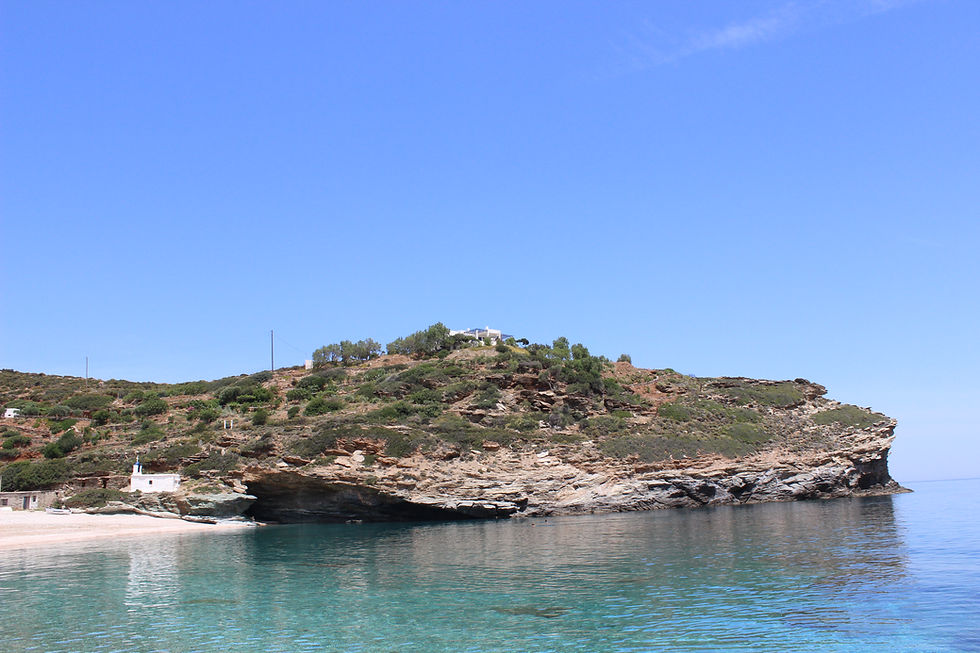
Rounding the rocky promontory that guards the harbour at Gavio I was sure I could detect a familiar scent, baked earth, pine and something floral, perhaps with a hint of seaside. (Although I am told, disappointingly, that the bracing seaside smell of Skegness, is not ozone as we all believed, but some nitrites produced by seaweed. Incidentally, is the underground railway still the only place to sniff ozone or will a Tesla do it too?)
Less familiar, but perhaps the reason why the aroma was so prominent, was the absence of any wind, which usually whips through the harbour, even though it is reasonably well protected from the ferocious northerlies that remove any chance of smelling anything.
But later in the day, as the sun dipped over the hill to the other side of the valley just after seven, there was no doubt of the heavenly bouquet from the ever expanding jasmine that hangs over the kitchen window, and has done really well this year. There is always a moment of excitement, tinged with a deal of anxiety, to see how the house and garden are after a winter away.
This time the hot water tank had burst, flooding the bathroom, but had been dealt with effectively by Joseph on one of his none too frequent visits. As usual the geraniums on the terrace were pleased to see us, proffering wreaths of vulgar bouquets. What generous plants they are; like a faithful hound that continues to reward its master with unconditional regard in spite of neglect and abuse. They cope with almost no regular watering and don’t mind when the wind snaps off a frond or two. They just give and give. Oleanders are even better, somehow summoning tender pink flowers that endure all season, from dust, air and the promise of moisture.
But it is the new olive trees that are the biggest concern – have they survived the winter, have the goats broken in and breakfasted on the tender new leaves? Has Joseph done something peculiar to my complex irrigation system, which he has never got to grips with, but I can’t properly explain in sign language?
Not bad.
Two have not made it but the others seem OK, albeit with less growth than I would have expected. Later Yanni tells us that it was a worrisomely dry winter, with only five days of rain. Now we are well into the long hot days of early summer and save for a random storm can expect no rain until October. I take a stroll down to the river which supplies all the water for our house and garden, and even before I arrive, I can tell by the sound of the flow that it is not up to much. Mmm. The worry is not now, but late August when the baked earth groans under the relentless sun, and the vegetation is aching for moisture. Last year we had a wet winter and the stream was good throughout, but the year before the flow was reduced to a trickle, the pump barely covered in a shallow pond, forced to cohabit with green weed and terrapins, who had moved down stream to chase the last inhabitable pool.
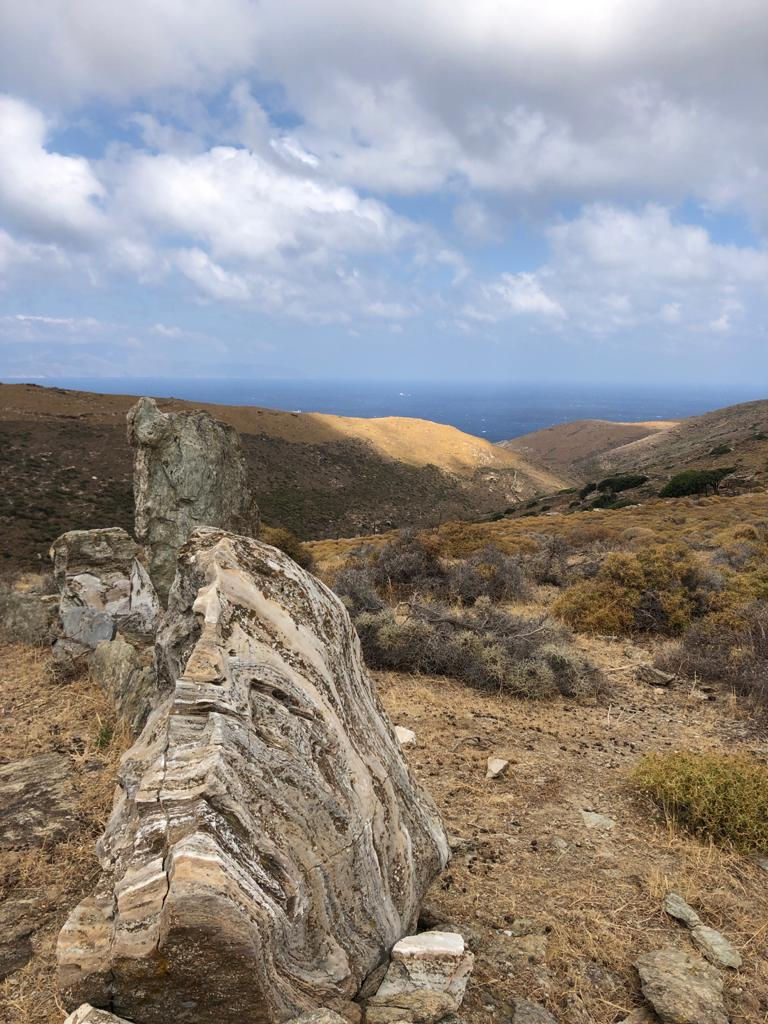
Walking the three miles our local beach, the unmade track is biscuit dry, but the trees are bursting with new shoots. The beach is a slow reveal, each corner and turn opening up a little more of the turquoise water. But there is a car! How outrageous to have to share this special strand of sand. Normally it is just us and a goat or two.
On the way home we come across a citrus of some description, laden with tangerine size fruit, many of which have fallen into the grass beneath. Carolyn tries one but predictably it is too bitter to eat. There is only one thing to do – make marmalade – so I gather an arm full of the less manky fruit and pack them into the bag with the damp swimming costumes. If we had been alone on the beach they wouldn’t have been damp.
Marmalade, like sourdough and beer is one of those remarkable staples where the simplest of ingredients produces something miraculous. But in spite of many years of trial and error, along with advice and reading, there is still this beguiling element of chance; you never know quite how it will turn out. On this occasion, I had no scales and only as much sugar as was in the jar, but it is truly wondrous – a triumph – perfect set, uniform size of rind nicely tender, lovely light colour to suit the Mediterranean setting, (nothing dark, thick cut or chunky here, thank you) and a clarity of the jelly the envy of Estee Lauder. The only trouble is I am not at all sure who is going to eat it other than me, and I am trying to eat less toast at breakfast. Tant pis.

Some years ago, when we arrived at this time of year we became aware of an insistent squawking coming from a few hundred yards (sorry metres) up the valley. After a day or two I realised that the caterwauling coincided with the arrival of a large bird of prey. Could it be that the elusive Bonelli's eagle was nesting in our valley? I decided to investigate and clambered through the thorny scrub to the area where I thought the nest might be. Suddenly there it was, not ten paces, (will that do?) in front of me. The squawking intensified not only from the twiggy platform in an old olive tree, but from the parents now circling in an agitated manner. I was able to get a terrible picture of one of the two chicks before beating a hasty retreat, hoping that my intrusion didn’t cause any lasting upset.
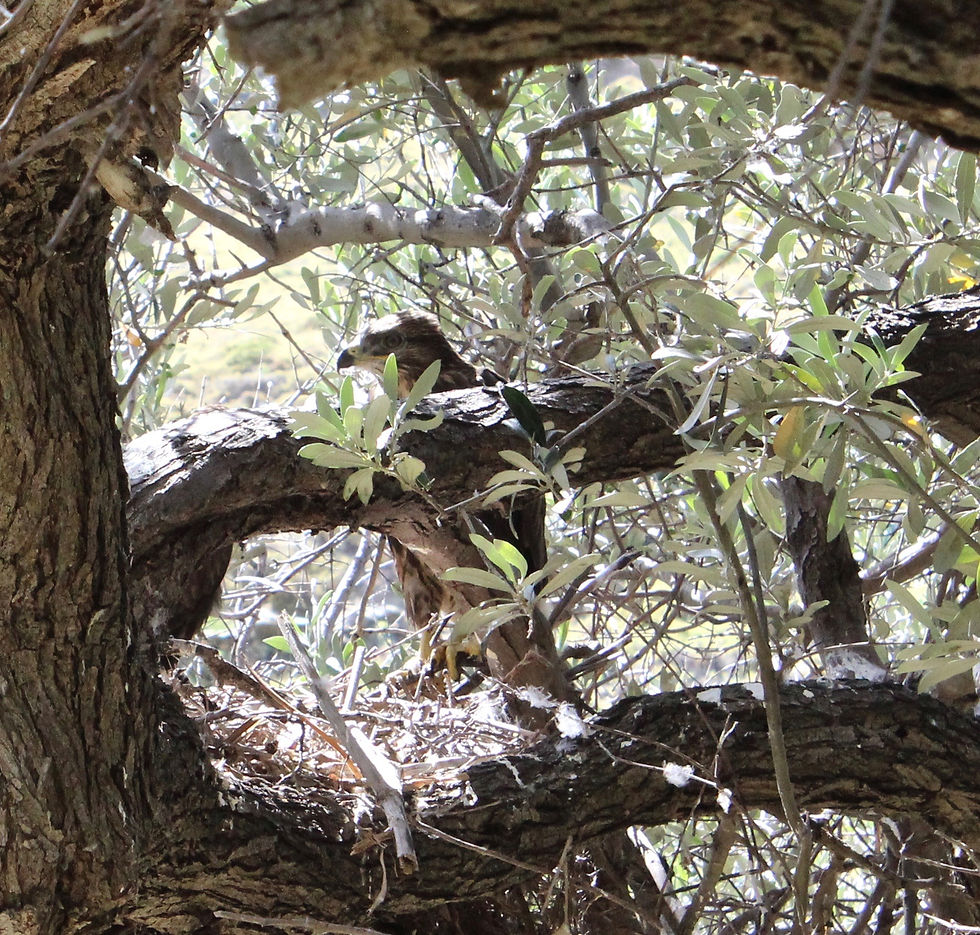
This year once again there is squawking. It is more episodic and further away, but once again the eagles are in sight, effortlessly soaring high above the ridge, dark fingered wings with a stylish flash of white on the underside when the turn and wheel.
But is this really the eagle of Signor Bonelli, an endangered bird, very rare across Europe but known to breed on the island? Can I be sure it isn’t a buzzard or something much more common? Sadly, the answer is no. I need the help of one the my twitcher friends who would tell at a glance, and be saying 'oh and by the way did you not just hear that Cetti’s warbler in the kalamia?' Bet Cetti was a mate of Bonelli. I can see them, in the twilight of their years, arguing about attribution as they sip Aperols in the Societa Di Ornithologia Natizonale di Francesca di Rimini or somesuch place.

To Syros where Carolyn has to meet a policeman for the next stage in securing her Greek residency permit, necessary to overcome the limitations of a maximum of a 90 day stay imposed on non-Europeans post Brexit.
Syros is grandly termed the Capital of the Cyclades but think not for a moment its equivalence being the Capital of the Hebrides. This is no tacky collection of crofts with an hotel and a police station, Ermoupolis is a miniature European capital constructed in the grandest Venetian style of granite and marble. It is the administrative capital of the Cycladic islands, and in a country that loves bureaucracy and administration, this means a myriad of bloated departments and organisations, which explains why the island has more than twice the population of Andros in a quarter of the area.

The city wins on many accounts. The back story is fascinating. The medieval fortified town, crowned by the Catholic cathedral of St George, lords over the city from a craggy hilltop back from the harbour. The newer city, next the waterfront, is mostly 19th century built at a time when the islands population massively grew due to an influx of orthodox Christians, dispossessed of home and country by the Ottomans, who also built a cathedral on a hill closer to the water. The Syriots remain rightly proud of their history in welcoming foreigners in need of sanctuary and claim that they were amongst the first citizens to set aside nationalism for the good of those less fortunate than themselves. The Greek preparedness, to warmly welcome foreigners, persists and explains why it still is such a fine country to visit.

In Evangelistria, on the oceanside of the main harbour wall, delightful 18th century residences stand hugger-mugger on the waterfront, a patchwork of random geometries, all with their own stories to tell but with a common sea lapping at their footings. This is where the locals swim, octogenarian confreres cautiously clambering rickety ladders into the crystal, but still cool Aegean. This is clearly as much a social activity as a personal mission, old friends celebrating still being alive, chattering with more vigour than swimming, gently accompanied by a collection of ducks and a swan. The place to watch this heartening vision of Hellenic city life is the terraces of Vaporia, where upmarket cafés serve superior breakfasts, and the affluent Syriots can participate in the swimming ceremony without getting wet.
The islands wealth and status stems from its position halfway between Venice and Constantinople, and its generous natural harbour, which made it the perfect stop for repairs, provisions and R & R. In the mid-nineteenth century here was a bigger port than Piraeus. Alas that changed with the building of the Corinth canal, after which the slow decline started. Although many of the beautiful buildings are dilapidated and crumbling, an equal number have been restored and become chic boutiques and cool restaurants. The place has a buzz of a commercial centre, which sits perfectly within the pedestrianised marble paved streets and proud grandeur.
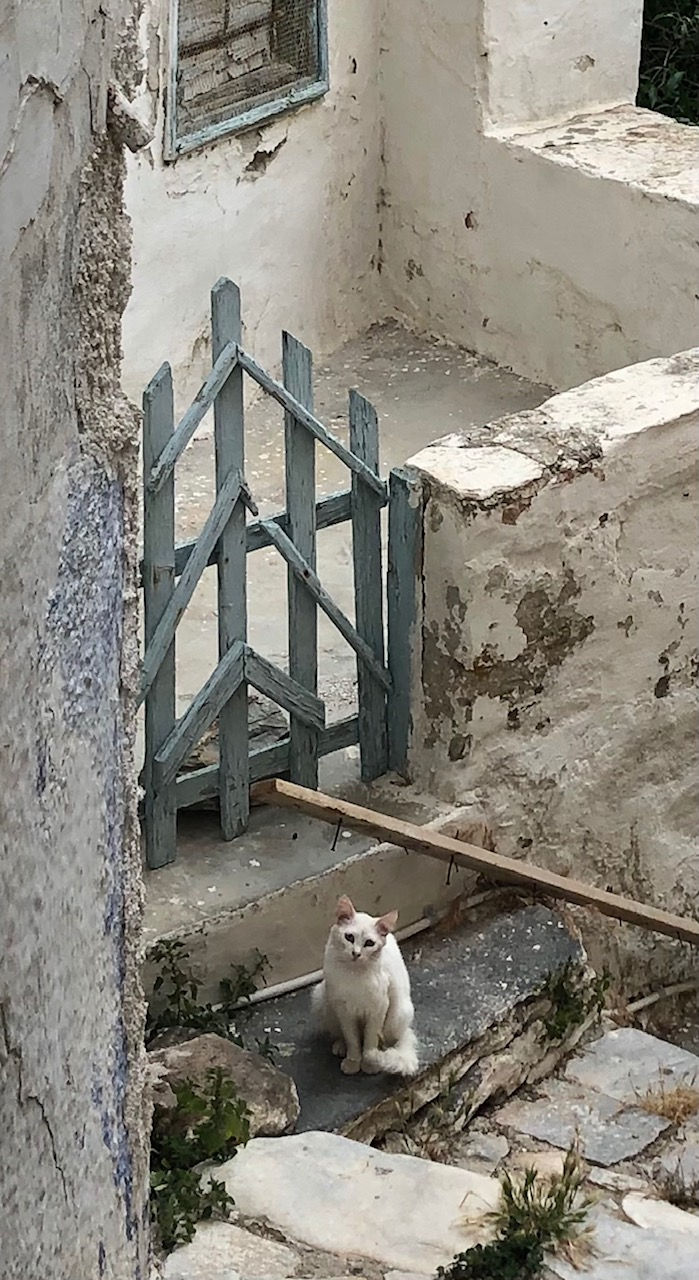
The joy is that it will never become an overt tourist destination because it is mostly about Greeks going about their business. The harbour-front may be dominated by a gorgeous Venetian style customs house, but across the water is the massive floating dock of Neorion Shipyards. This is the Harland and Wolf equivalent, anchoring the city in an artisanal present. It will never be twee. Thankfully the tourists come second here, which contrarily makes it a much nicer city to visit.
Ermoupolis, like most Greek cities is full of statues. All are almost identical; simple busts on head-high plinths of white stone, always narrowed across the shoulders. The way the amputated arms are fixed close by the side gives the impression that the figure is tied to the stone or in a straitjacket. The amusing thing is that they all look exactly the same, unremarkable features save a Levantine nose and receding hairline. They come in two models; with or without glasses. With concerning lack of respect, I imagine the council ordering another couple of statues and having simply to confirm whether they should arrive with, or without glasses.
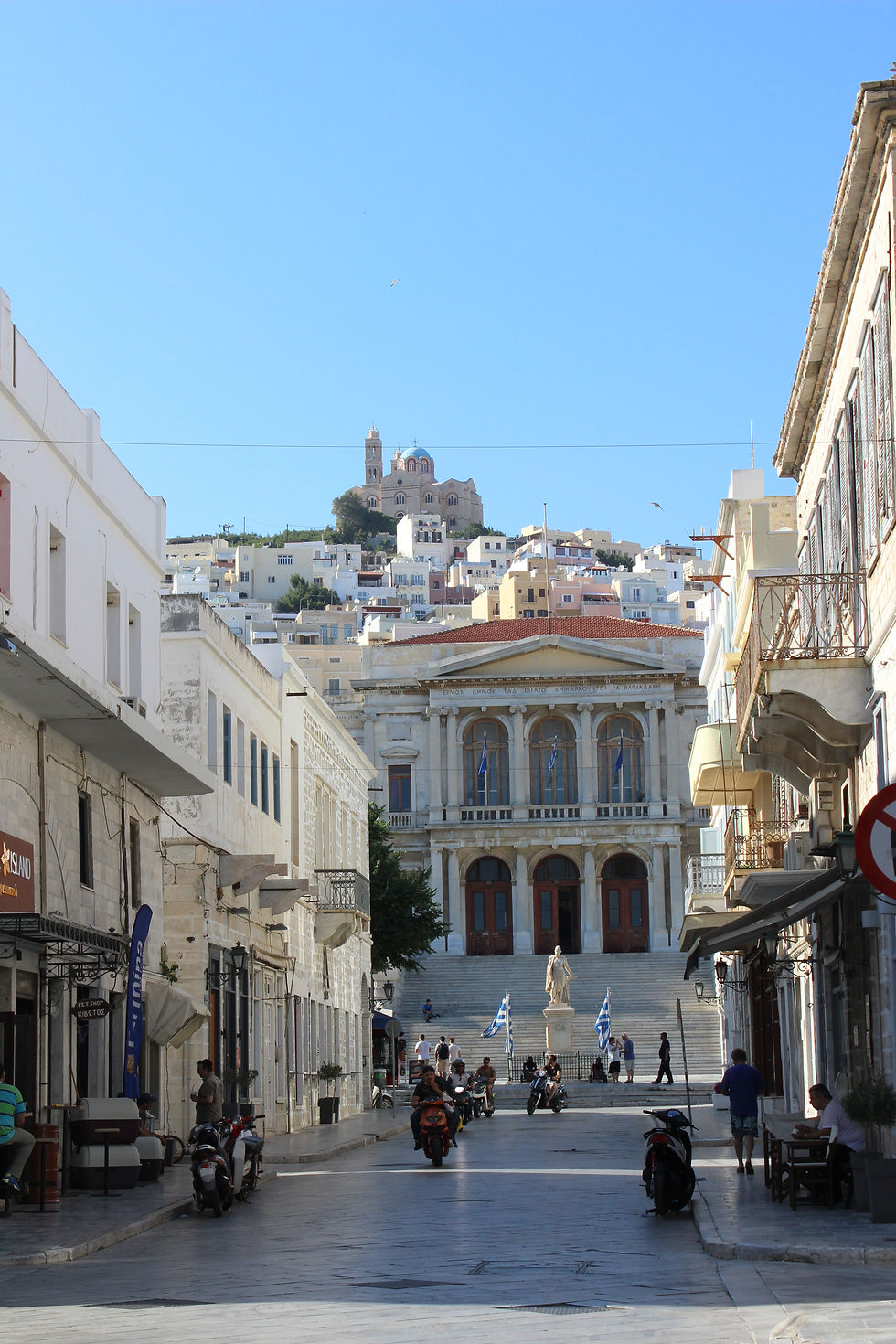
I don’t suppose that decolonialization is an issue here. As in Athens, graffiti is a common addition to vacant building and unkempt walls. Mostly it seems to have an antifascist tone, albeit that mostly I haven’t a clue what it says. Maybe the youth of Syros are more concerned with jobs and democracy than whether their civic burghers were exploitative or racist.
It still charms me that we order our wine here by the ‘miso kilo’, but we need to remember that for a Greek this is not half of a kilogram of mass, rather ‘half a thousand’. ‘Oh, and can I have half a thousand of wine please?’ The way our persecution of all things imperial is progressing, is only a matter of time before a pint will be 0.489 kilo. What about feet and inches? Will my foot have to become my 305mm? I am also a bit worried about the brakes on my car. A little knowledge is a dangerous thing; I know that I have a ‘master cylinder’ and then, under complete control and subservient, a ‘slave cylinder’. It will only be a matter of time…
Which brings us back to Napoleon and the introduction of the System Internationale. How should we view this? Do the French think he is still a hero or are they trying to tear down monuments and statues?
Our ferry home carves a foaming wake just off Tinos and I try to sniff the island. Either I have Covid or there is little to smell.
Didn’t Napoleon also write to Josephine ‘don’t wash, I am coming home.’ Perhaps it wasn’t the sweet floral bouquet of the Maquis he was sniffing, but the unwashed Josephine.

Quite natural to feel a sliver of sympathy for the lost remainer cause when Carolyn has to become an alien requiring residency status to stay in Greece longer than 90 days, having been in the past a Citoyenne European. But you got to experience Syros! And give a wonderful account of the place: thanks as ever. Made me wonder what the Greeks feel about Brussels after their failed attempt to leave and the ruination of their economy by German bankers. Does their love of bureaucracy chime with the collective bureaucracies of 27 other countries? Or do they envy our island sovereignty? On migrants we have common cause although our water is wider and more violent in Winter!